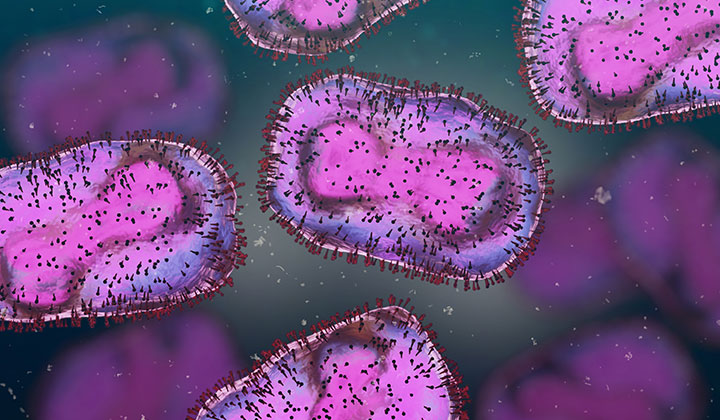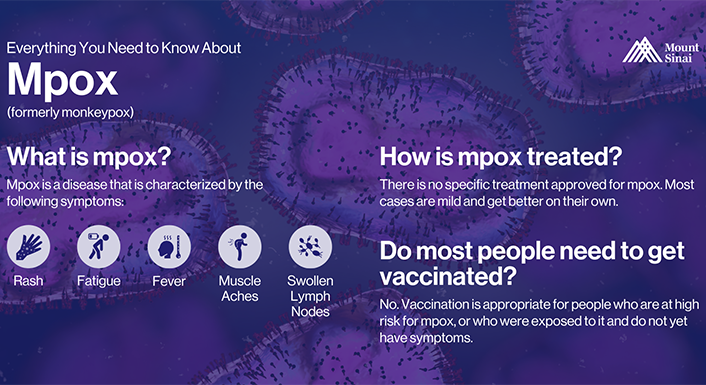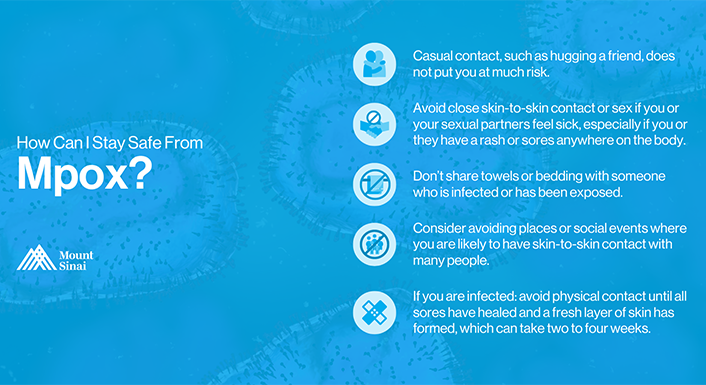Mpox

Mpox, the disease caused by the monkeypox virus, is rare. Over the last few months there has been an increase in cases among people who have not traveled to areas where mpox was considered more common. Symptoms can include fever, swollen lymph nodes, and a rash. Currently, mpox seems to be most prevalent among men who have sex with other men. Most cases are mild and get better on their own. However, mpox can be very painful, and depending on where it appears and the extent, the rash can lead to permanent scarring.
Symptoms and Spreading
The most obvious symptoms of mpox are rash and fever. The rash usually looks like pimples or blisters and often appears on the face, hands, feet, chest, or genitals. Other symptoms include:
- Aches in muscles and back
- Chills
- Exhaustion
- Headache
- Swollen lymph nodes
Mpox spreads mostly through close physical contact between people. You can also catch it through contact with fabrics and other objects that have been used by someone with mpox, such as sheets or towels. While respiratory droplets can also spread the virus, it requires prolonged face-to-face exposure—usually about three hours.
Diagnosis
The first steps in diagnosing mpox are looking at the rash and taking a patient history. If you have traveled in the last month to a country with confirmed or suspected cases of the virus—including Africa and most large European cities—you might be more likely to have mpox. Similarly, if you have had contact with someone who has a confirmed or suspected case of the virus or who identifies as a man and reports sexual contact with other men, the doctor might suspect mpox. To make a definitive diagnosis, we swab the rash and send it to the lab for testing.
Results of lab tests may take three or four days, so if your doctor thinks you have mpox, they will tell you to isolate at home until the results come back. To keep others from catching mpox, you should isolate at home, away from other family members and pets. Cats and dogs can catch mpox. If you test negative, your doctor may tell you that you can leave isolation.
Treatment
Most mpox cases get better without medication. But while you have active symptoms, you will want to protect others from catching the virus. You can do this by isolating yourself at home. Stay in a separate room or area away from other family members and pets until the lesions fall off, scab over, and are replaced with new skin. This usually takes two to four weeks.
If you are severely immunocompromised, you may need treatment. This group includes people who have advanced HIV, organ transplants, or are receiving chemotherapy for cancer treatment. For these patients, we may prescribe antivirals.
How to Protect Yourself
The best way to protect yourself from getting mpox is to:
- Minimize the number of sexual partners you have.
- Ask your sexual partners if they have a rash or other mpox symptoms.
- Avoid skin-to-skin contact with someone who has a rash or other mpox symptoms.
- Condoms can help, but since mpox is not a sexually transmitted infection, condoms will only protect you from any rash on the penis; they won’t protect you from a rash on the arms or legs.
- Mpox vaccine may be available through your local health department. In New York City, you can visit this website for more information about whether you are eligible for and how to get vaccinated.
If you have scheduled a visit with a health care provider and you are concerned that you have mpox or could have mpox, please let the clinic or facility know before you arrive.
Vaccination Eligibility
If you have been exposed to mpox, getting vaccinated may keep you from getting sick. Vaccination is most effective within four days of exposure but can help up to 14 days later.
Vaccine is currently available for at-risk populations, defined by the New York City Department of Health and Mental Hygiene (DOHMH). To be eligible to receive the vaccine, you must meet any of the following criteria:
- People of any sexual orientation or gender identity who have or may have multiple or anonymous sex partners, or participate or may participate in group sex
- People of any sexual orientation or gender identity whose sex partners are eligible per the criteria above
- People who know or suspect they have been exposed to mpox in the last 14 days
- Anyone else who considers themselves to be at risk for mpox through sex or other intimate contact.
Eligible individuals can schedule appointments via the New York City site. We are also offering mpox vaccination on a walk-in basis at the Mount Sinai-Union Square Urgent Care location, Monday-Friday from 8 am to 7 pm.

